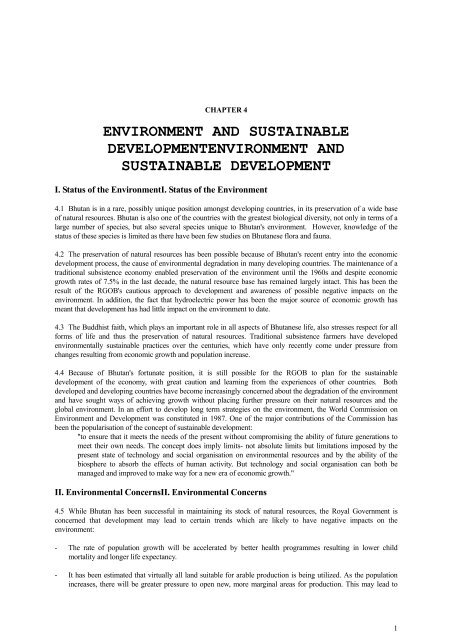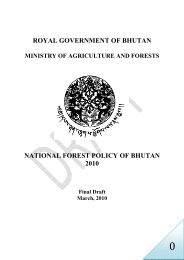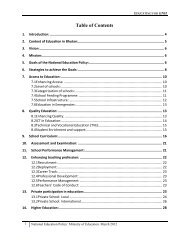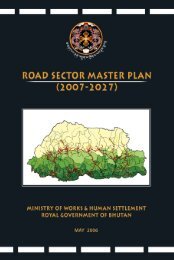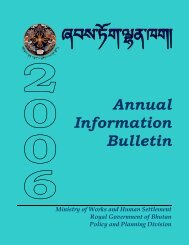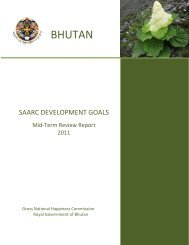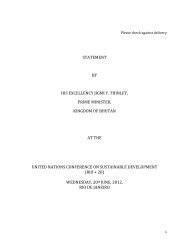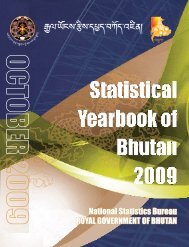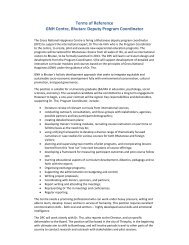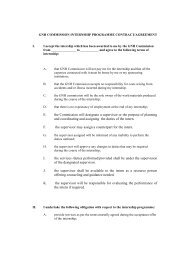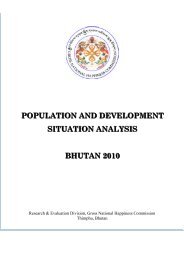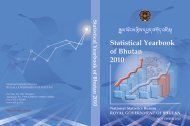COUNTRY BACKGROUND - Gross National Happiness Commission
COUNTRY BACKGROUND - Gross National Happiness Commission
COUNTRY BACKGROUND - Gross National Happiness Commission
You also want an ePaper? Increase the reach of your titles
YUMPU automatically turns print PDFs into web optimized ePapers that Google loves.
CHAPTER 4<br />
ENVIRONMENT AND SUSTAINABLE<br />
DEVELOPMENTENVIRONMENT AND<br />
SUSTAINABLE DEVELOPMENT<br />
I. Status of the EnvironmentI. Status of the Environment<br />
4.1 Bhutan is in a rare, possibly unique position amongst developing countries, in its preservation of a wide base<br />
of natural resources. Bhutan is also one of the countries with the greatest biological diversity, not only in terms of a<br />
large number of species, but also several species unique to Bhutan's environment. However, knowledge of the<br />
status of these species is limited as there have been few studies on Bhutanese flora and fauna.<br />
4.2 The preservation of natural resources has been possible because of Bhutan's recent entry into the economic<br />
development process, the cause of environmental degradation in many developing countries. The maintenance of a<br />
traditional subsistence economy enabled preservation of the environment until the 1960s and despite economic<br />
growth rates of 7.5% in the last decade, the natural resource base has remained largely intact. This has been the<br />
result of the RGOB's cautious approach to development and awareness of possible negative impacts on the<br />
environment. In addition, the fact that hydroelectric power has been the major source of economic growth has<br />
meant that development has had little impact on the environment to date.<br />
4.3 The Buddhist faith, which plays an important role in all aspects of Bhutanese life, also stresses respect for all<br />
forms of life and thus the preservation of natural resources. Traditional subsistence farmers have developed<br />
environmentally sustainable practices over the centuries, which have only recently come under pressure from<br />
changes resulting from economic growth and population increase.<br />
4.4 Because of Bhutan's fortunate position, it is still possible for the RGOB to plan for the sustainable<br />
development of the economy, with great caution and learning from the experiences of other countries. Both<br />
developed and developing countries have become increasingly concerned about the degradation of the environment<br />
and have sought ways of achieving growth without placing further pressure on their natural resources and the<br />
global environment. In an effort to develop long term strategies on the environment, the World <strong>Commission</strong> on<br />
Environment and Development was constituted in 1987. One of the major contributions of the <strong>Commission</strong> has<br />
been the popularisation of the concept of sustainable development:<br />
"to ensure that it meets the needs of the present without compromising the ability of future generations to<br />
meet their own needs. The concept does imply limits- not absolute limits but limitations imposed by the<br />
present state of technology and social organisation on environmental resources and by the ability of the<br />
biosphere to absorb the effects of human activity. But technology and social organisation can both be<br />
managed and improved to make way for a new era of economic growth."<br />
II. Environmental ConcernsII. Environmental Concerns<br />
4.5 While Bhutan has been successful in maintaining its stock of natural resources, the Royal Government is<br />
concerned that development may lead to certain trends which are likely to have negative impacts on the<br />
environment:<br />
- The rate of population growth will be accelerated by better health programmes resulting in lower child<br />
mortality and longer life expectancy.<br />
- It has been estimated that virtually all land suitable for arable production is being utilized. As the population<br />
increases, there will be greater pressure to open new, more marginal areas for production. This may lead to<br />
1


